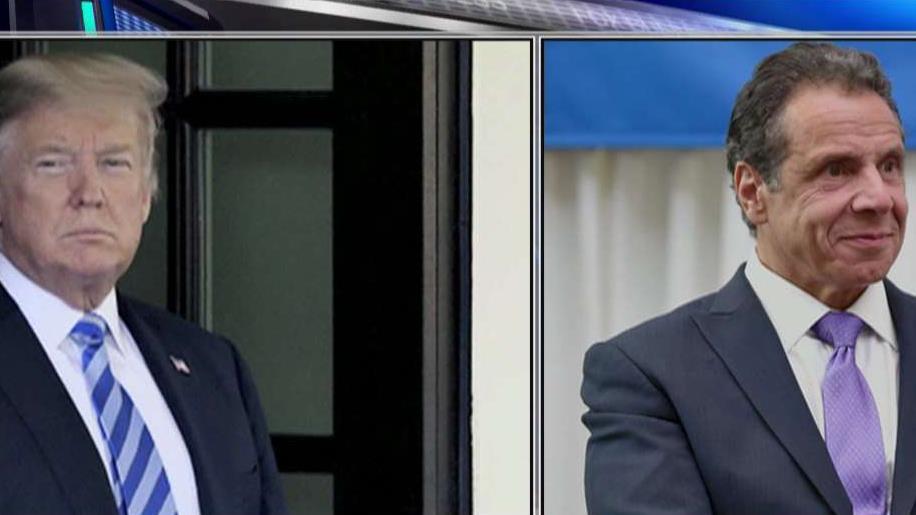New York, New Jersey could lose residents to this lower-tax neighbor
After many Americans in high-tax states saw the impact of the $10,000 cap on state and local tax (SALT) deductions on their returns this filing season, experts have told FOX Business that more and more individuals are looking for ways to mitigate the increased financial burden – which can mean moving to lower-tax states.
While states with no income tax have gotten most of the attention, including Florida, Texas and Nevada, there may be a closer option for residents in the Northeast – Pennsylvania. The Keystone State could attract disgruntled residents from nearby high-tax states like New York, New Jersey and Connecticut.
“It definitely is a viable option,” Alan Goldenberg, a principal at Friedman LLP, told FOX Business. “It really boils down to rates.”
Pennsylvania charges a flat income tax rate of 3.07 percent. That compares to a top rate of more than 8 percent in New York and New Jersey.
But for individuals in New Jersey, a move across state lines could be particularly attractive. New Jersey and Pennsylvania have a reciprocal personal income tax agreement, Goldenberg noted, whereby Pennsylvania residents who work in New Jersey and earn income there are not subject to New Jersey income taxes. Instead, they pay the lower flat-rate in their home state.
Without the agreement, a high-earning Pennsylvania resident working in New Jersey would be taxed at the 8.97 percent rate, but would only received a credit of 3.07 percent in Pennsylvania.
“It’s a big deal that they have this agreement,” Goldenberg said.
Geoffrey Weinstein, special counsel in the Tax, Trusts & Estates Department of Cole Schotz, told FOX Business he has seen relocations to Pennsylvania in order to avoid taxes – specifically among those people who cannot get up and move to Florida, like those with young children in school. Weinstein, who has offices in both New Jersey and Florida, says the move makes sense for people working in places like Princeton, New Jersey, but that others are still looking at the option because of the “huge disparity in state taxes.”
Weinstein also noted that a renewed push to implement a New Jersey millionaire’s tax – with a top rate of 10.75 percent – on people with incomes over $1 million, could also urge residents to consider moving to a local, lower-tax destination such as Pennsylvania.
Both Goldenberg and Weinstein noted, however, that New Jersey has debated altering its reciprocal agreement with Pennsylvania throughout recent years.
In terms of business relocation, Joe Pizzimenti, a tax director specializing in state and local tax services at Margolin, Winer & Evens, told FOX Business Pennsylvania that a potential move into Pennsylvania could be worth a discussion.
According to the Tax Foundation’s 2019 State Business Tax Climate Index, which ranks states based on a handful of metrics – including personal income tax, sales tax and property taxes – Pennsylvania ranked 34.
Meanwhile, Connecticut, New York, California and New Jersey occupy the four lowest spots on the index.
Pizzimenti noted that there are an increasing number partnerships, S Corps and other pass-through entities, which are more sensitive to personal income tax rates.
Overall, Pizzimenti noted that Pennsylvania does not necessarily compare to the likes of Texas or Florida, and that decisions to relocate are driven by a combination of factors that extend beyond tax rates.
CLICK HERE TO GET THE FOX BUSINESS APP
Adding to restlessness among wealthy taxpayers, the Treasury Department issued a final ruling earlier this month, effectively squashing a workaround higher-tax states were attempting to use to help their residents evade the cap. The strategy involved allowing taxpayers to make charitable contributions to an established state fund in order to earn a credit.
The $10,000 cap is well below the average amounts claimed by individuals in states like New York, California and New Jersey. The average deduction claimed in California, for example, is $22,000, according to Kevin de Leon, a Democratic member of the California state senate.
Multiple states – including New York – have sued over the $10,000 cap.




















